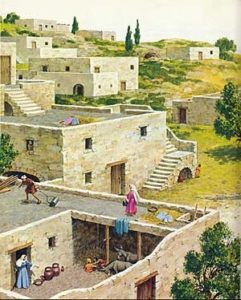“When you build a new house, you must build a low wall around your roof; otherwise someone may fall from it, and you will be responsible for his death.”-Deuteronomy 22:8
The subject of a Hebrew’s requirement to be a Godly humanitarian in BOTH attitude and action takes on a new light from verse 8.
We’re told that when an Israelite builds a new house, he must construct a low wall around the roof.
This was obviously an instruction that wouldn’t be applied until a few months later until the Israelites led by Joshua conquered the Promised Land and they transitioned from a lifestyle of nomadic wanderers to settled residents who would begin living in permanent housing.
The low wall that was to be built around the roof is called a “parapet”.
It was basically a balcony railing situated around the edges of the roof a house.
It purpose was to ensure that someone (like a running toddler for instance) wouldn’t accidentally fall off and die.
You may be wondering…
…were folks back then spending so much time up on the roof?
Well, the answer to that question is…
…um…
…yes.
See the picture I posted up above.
Your average ancient Middle Eastern home was built with a flat roof and it was considered to be just another living area like the spaces below it.
In order to ensure easy and quick access to the roof, stairs or ladders were also built connecting to it.
All kinds of practical activities occurred up on the roof.
The roof was used to dry and store produce and fish.
It was a place where you could invite family and friends to come over and chill on a nice day.
And during the blistering heat of the summer months, it was a place where everyone slept.
It kind of reminds me of a time in the past when I celebrated SUKKOT with a congregation I used to attend.
They would build their SUKKAH up on the roof of their building and sleep up there.
So the point is…
…given all this human activity that was taking place up on the roof, it made perfect sense to build a safety fence around the roof’s edges to prevent someone from accidentally slipping, falling down and seriously injuring oneself or dying.
Verse 8 tells us in no uncertain terms what the consequences are for the owner of the house if such an irreversible tragedy was to occur.
“…YOU will be responsible for his death”.
That’s right.
When death occurred as the result of the homeowner’s foolish disregard for the welfare of others, he would be saddled with BLOODGUILT!
You should well understand by now the serious spiritual and physical ramifications connected to bloodguilt.
Heck, we went over it enough times this past month.
Bottomline, the homeowner who didn’t properly establish those safeguards on his roof would be guilty of negligent homicide if someone slipped off his roof and died as a result.
The Lord would surely require his life for payment.
To close, what I really like about this particular instruction in Deuteronomy 22 is that it demonstrates how the Lord is so thorough and detailed when it comes to caring for even the practical daily aspects of our lives down to making sure a wall is built around the edges of the roofs of our homes.
His commands are not all pie-in-sky completely devoid of practical application for the here and now.
HASHEM cares about YOU today and how you will be fed and clothed and your safety just as much or even more than a mother tenderly cares for her young.




Leave a Reply